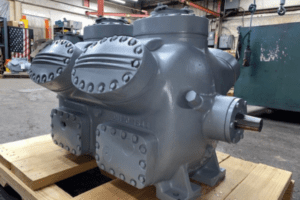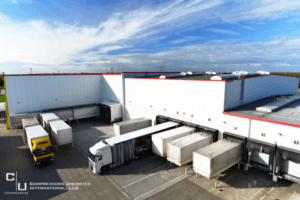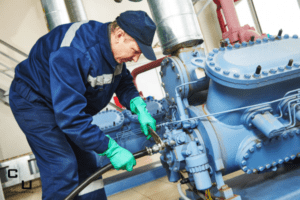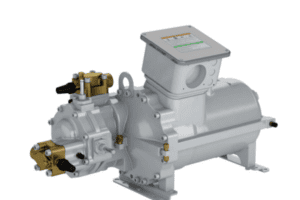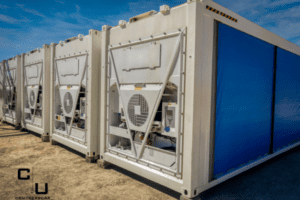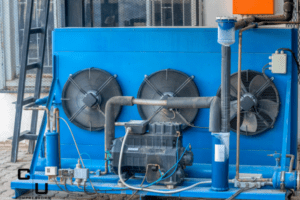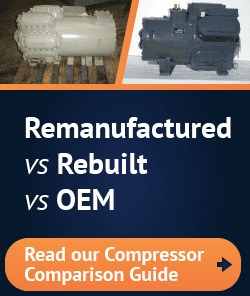As winter rolls in, your commercial compressor has a whole new job to do.
Because of what a compressor does – compress refrigerant gas – it’s easy to think of it in terms of keeping your building cool. In warmer climates, such as South Texas and Florida, plenty of time and attention go to this function every year.
In the high heat of summer, a compressor problem means your business could be sweltering hot in less than an hour. That has a profound effect on the well-being of your employees and the public.
Those who’ve lived in warmer areas know what it’s like to walk into an air conditioned building and feel that first, welcome blast of cool. In June, July, and August, this can influence foot traffic.
But your commercial compressor is just as important to your facility in the cold.
Your Compressor is Indispensable to Your Heating Functions
When an HVAC system runs out of refrigerant, it generally leads to lukewarm air cycling through the ductwork. This can create the mistaken impression that the compressor, which affects the refrigerant most directly, is only important when the weather is warm. In fact, its function remains crucial all throughout the year.
The compressor is not only the “heart” of the air conditioner but also of the heat pump.
The main role of the heat pump is to extract heat from the exterior air and transfer it to the refrigerant. It works with the compressor, which pressurizes refrigerant gas for both heating and cooling purposes. Depending on which mode the heat pump is in, the gas can then go to the indoor or outdoor condenser coil.
Without the compressor, the refrigerant gas will never reach the appropriate temperature or traverse the system to reach the condenser coil. This means that the effect of a bad compressor in the winter is very much the same as in the summer: Your HVAC will not work and you’ll need to replace the unit.
The Compressor is the Key to Energy Efficiency in Heating
Commercial heat pumps are remarkably similar to those used in homes on a bigger scale. It might seem surprising that so many commercial buildings use this method when resistive electric heat is available. When it comes to savings and efficiency, however, it all makes sense – and the compressor unit is the key.
Resistive electric heating uses a very large amount of electricity even in an average home. Heating even a small office or commercial structure this way would quickly drive costs up. Even in areas where heating is needed for just a few months out of the year, costs and environmental impact would both be substantial.
Similar problems emerge when you consider fuel-burning furnaces such as those used in the Northeast.
A fuel-burning heating system in a commercial environment would add significant complexity to any business. Day-to-day heating operations would add the risk of fire and environmental contamination. Maintenance would need to be carried out virtually around the clock, and heating discontinued if any issues were discovered.
Compared to these alternatives, the modern commercial heat pump makes a lot of sense.
Your heat pump is extremely efficient in part because of the way the whole system is designed for refrigerant gas. The combination of the right refrigerant chemicals and a high-performance compressor makes heat transfer easy. This reduces the need for manual heating through electricity or fossil fuels.
Make Sure Your Compressor is Ready for Winter
Just as homeowners have their heaters checked before the brunt of winter strikes, it’s a good idea to double-check that all your HVAC maintenance routines are being followed. Each month, quarter, and year will bring its own HVAC maintenance requirements that can keep your system working strong.
Remember that lack of maintenance is one of the biggest causes of preventable HVAC failures!
The average commercial compressor lasts about 10-12 years. Compressors tend to start losing efficiency around their eighth year of service, and a plan should be in place for replacement when year ten rolls around. This is true even if you have been very careful with your maintenance.
If you are not sure your compressor will weather the cold, there is a simple solution.
A remanufactured commercial compressor is a budget-friendly way to deploy a compatible compressor to your workplace. With help from a trusted remanufacturing team, you can accelerate turnaround time for a new unit by several weeks without compromising on quality.
When a compressor is completely remanufactured, it is disassembled and all components are examined. Any necessary replacements are made to ensure performance comparable to an all-new unit. The interior and exterior are fully cleaned and the unit is generally tested under load.
In all weather, your compressor is vital to indoor climate control. Be sure you can rely on it this winter!


